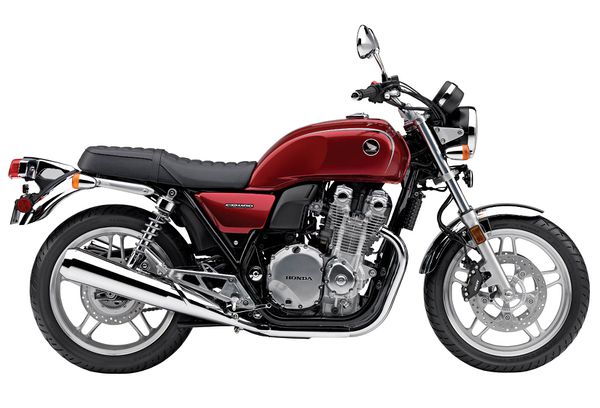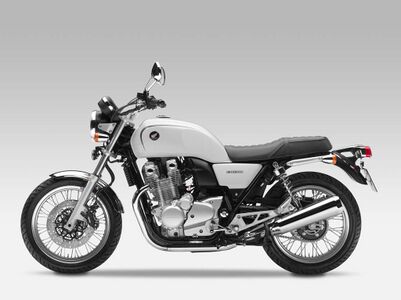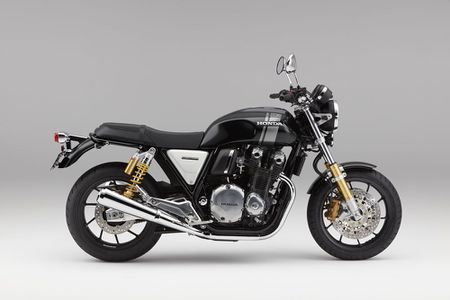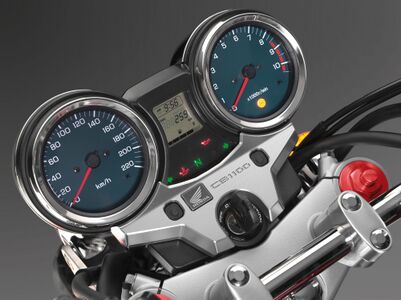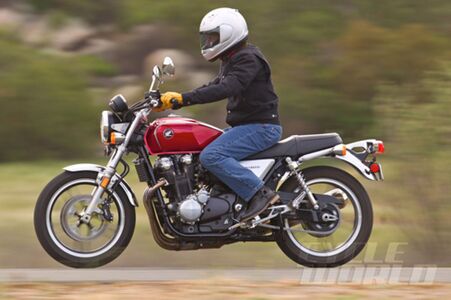The classic motorcycle Honda CB 1100 was introduced in 2010 as a modern replacement for the Honda CB750 and a continuation of the old Honda CB1100F. Since 2010, the motorcycle has been officially sold in the markets of Japan, Australia and New Zealand, and since 2013 it has become available in Europe and the USA.
Main competitors:
The Honda CB 1100 is based on an in-line 4-cylinder air-oil-cooled engine with a volume of 1140 cc. see, giving out about 90 hp. power and 91-93 Nm of torque. Maximum performance - at 5000-7500 rpm.
The model features a classic tubular steel frame, simple telescopic fork and double shock suspensions at the rear, disc brakes, ABS versions and classic 80s motorcycle shapes.
The main modifications of the Honda CB1100:
- Honda CB1100 is the regular version.
- Honda CB1100DLX (Deluxe) - available from 2014. Based on 2nd generation CB1100. It features an enlarged fuel tank (16.8 liters), 4-in-2 exhaust, ABS, a different seat and some other details.
- Honda CB1100EX - available since 2014. Based on the Deluxe (DLX) but with spoked wheels.
- Honda CB1100RS - available from 2017. It features new rims, 120 and 180 mm tires, LED optics, a 5 mm shortened wheelbase, new suspensions (43 mm fork, Showa rear shocks with remote reservoirs; gold color), new Tokico brakes with radial calipers and increased diameter (310 mm).
Major generations of the Honda CB1100:
- Honda CB1100 (2010-2013) - first generation . The model has a 5-speed gearbox, 248 kg of curb weight, is produced in only one modification (+ version with ABS) and is sold mainly in the markets of Japan and Oceania (Australia, New Zealand).
- Honda CB1100 (2014+) - second generation. The model gets a 6-speed gearbox and + 3 new versions (EX, DLX, RS - from 2017). From this generation the model is also available in the North American and European markets.
Photos
Specifications
Specifications Honda CB 1100:
| Model | Honda CB1100 (CB1100EX, CB1100DLX, CB1100RS) |
|---|---|
| Motorcycle type | classic |
| Release year | 2010+ |
| Frame | steel duplex |
| Engine type | 4-cylinder, 4-stroke, in-line |
| Working volume | 1140 cc cm. |
| Bore / stroke | 73.5 x 67.2 mm |
| Compression ratio | 9.5: 1 |
| Cooling | air-oil |
| Number of valves per cylinder | DOHC, 4 valves per cylinder |
| Fuel supply system | electronic injection (PGM-FI) |
| Ignition type | transistor |
| Maximum power | 89.7 hp at 7500 rpm |
| Maximum torque | 91 Nm @ 5500 rpm - CB1100EX, CB1100RS, CB1100 (2010-2013)
93 Nm @ 5000 rpm - CB1100 (2014+) |
| Gearbox | 5 speed - CB1100 (2010-2013)
6-speed - CB1100 (2014+) |
| Drive type | chain |
| Front tire size | 110 / 80R18 M / C 58V - CB1100, EX, DLX, Deluxe
120 / 70ZR17 M / C 58V - CB1100RS |
| Rear tire size | 140 / 70R18 M / C 67V - CB1100, EX, DLX, Deluxe
180 / 55ZR17 M / C 73W - CB1100RS |
| Front brakes | 2 discs, 296mm, 4-piston calipers (ABS) - CB1100, EX, DLX, Deluxe
2 discs, 310 mm, 4-piston radial calipers (ABS) - CB1100RS |
| Rear brakes | 1 disc, 256 mm, 2-piston caliper (ABS) |
| Front suspension | 41mm Telescopic Fork (Preload Adjustable), 106mm Travel - CB1100 / EX / DLX
43mm Telescopic Fork (preload adjustable) - CB1100RS |
| Rear suspension | swingarm with two shock absorbers (adjustable preload), stroke - 114 mm - CB1100 / EX / DLX
swingarm with two Showa shock absorbers with remote reservoirs (adjustable preload) - CB1100RS |
| Maximum speed | 220.0 km / h |
| Acceleration to 100 km / h | 3.7 sec |
| Fuel tank capacity | 16.8 L - CB1100EX, CB1100RS, CB1100DLX (Deluxe)
14.6 L - CB1100 |
| Length x Width x Height | 2200 (2205 - DLX) x 830 x 1130mm - CB1100EX, CB1100 / DLX / Deluxe
2180 x 800 x 1100 mm - CB1100RS |
| Saddle height | 780 mm - CB1100 / EX
765 mm - CB1100DLX (Deluxe) 785 mm - CB1100RS |
| Wheelbase | 1490mm - CB1100EX, CB1100 / DLX / Deluxe
1485 mm - CB1100RS |
| Motorcycle weight (curb) | 248 kg - CB1100 (2010-2013)
252 kg - CB1100 (2014+) / DLX / Deluxe / CB1100RS 255 kg - CB1100EX |
Fuel consumption
The officially declared fuel consumption for the Honda CB 1100 is approximately 3.19 liters (Japanese method, 60 km / h) to 5.29 liters (WMTC method) per 100 kilometers. The exact value depends on the riding style.
Documentation
